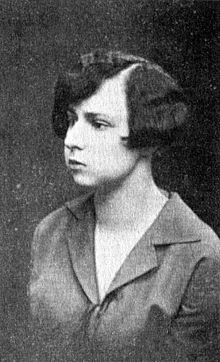Loading AI tools
Belarusian playwright and poet (1903–1997) From Wikipedia, the free encyclopedia
Natallia Alyakseyewna Arsiennieva[a] (20 September 1903 – 25 July 1997) was a Belarusian playwright, poet and translator who authored the lyrics to the hymn "Mahutny Boža" ("Almighty God"). She was married to Francišak Kušal.
Natallia Arsiennieva | |
|---|---|
 | |
| Native name | Наталля Арсеннева |
| Born | September 20, 1903 Baku, Russian Empire |
| Died | July 25, 1997 (aged 93) Rochester, New York, U.S. |
| Occupation | Linguist, playwright, translator, poet, writer |
| Language | Belarusian, Russian |
| Citizenship | Russian Empire → Poland → United States |
| Spouse | Francišak Kušal |
Arsiennieva was born on 20 September 1903 into a middle-class family in Baku, a major oil-producing centre of the Russian Empire (today the capital of Azerbaijan).[1]

In 1905, Arsiennieva's family moved first to Volhynia (Volyn) and then to Wilno (Vilnius) where she spent her childhood and graduated from the Belarusian gymnasium of Wilno in 1921. She later studied at the Arts Department of the University of Wilno.[2][3]
In 1922, Arsiennieva married Francišak Kušal, a prominent figure of the Belarusian independence movement and Nazi collaborator.[2][3]
Following the Soviet invasion of Poland, her husband, who was at the time an officer of the Polish army, was taken as a prisoner of war and spent a year in Soviet incarceration before being sent to Minsk in 1941. After Minsk was captured by the German army in 1941, he became a Nazi collaborator, rising to become a commander in the Belarusian Home Defence.[4]
Arsiennieva worked for a regional Soviet newspaper but was soon arrested and deported as a "bourgeois nationalist intellectual" to Kazakhstan with her two sons. However, in early 1941, she was released after a petition by the Belarusian Union of Writers and moved to Minsk, where during the German occupation she also collaborated with the Nazis, working for the pro-Nazi Belaruskaya Gazeta. She wrote several librettos for operas and was engaged in translations.[2][5][3]
In 1944, Arsiennieva moved to Germany, and in 1950, to the United States. She was involved in the establishment, and was a long-term secretary, of the Belarusan-American Association. She was also the editor of the newspaper Biełarus and worked for Radio Free Europe/Radio Liberty and the Belarusan Institute of Arts and Sciences.[2][5][3]
Arsiennieva died on July 25, 1997, in Rochester, New York, and is buried in a local cemetery.[6][7]
Arsiennieva's works were banned in Soviet Belarus; however, she lived to see their return to her homeland. Since Gorbachev's perestroika, her poems have gained popularity, especially "Prayer", which, set to music by composer Mikola Ravienski, has become the hymn "Mahutny Boža" ("Almighty God"). In 1991, the publishing house "Mastackaja litaratura" published her facsimile "Under the Blue Sky"("Пад сінім небам"). In 1996, in the series "Voices of the Belarusians Abroad", a collection of selected poems "Another Spring" ("Яшчэ адна вясна") was published, and in 2002, a compilation of her selected poems was published.[3]
However, since 1998, her works have been excluded from the school curriculum by the government of Alexander Lukashenko.[3][8]
In 2003, a monument was erected in her memory in the town of Staryya Darohi, Minsk Region, on the territory of a private museum.[9] In November 2022, the monument was removed.[10]
Seamless Wikipedia browsing. On steroids.
Every time you click a link to Wikipedia, Wiktionary or Wikiquote in your browser's search results, it will show the modern Wikiwand interface.
Wikiwand extension is a five stars, simple, with minimum permission required to keep your browsing private, safe and transparent.